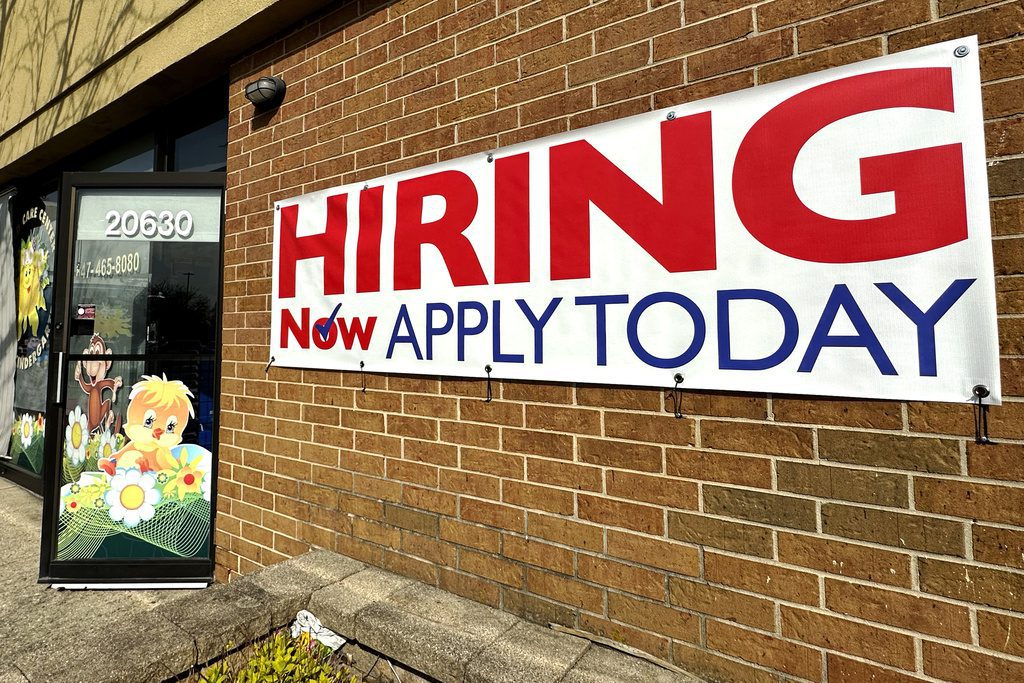
FILE - A hiring sign is displayed in Riverwoods, Ill., Tuesday, April 16, 2024. The Biden administration has finalized a new rule set to make millions of more salaried workers eligible for overtime pay in the U.S. The move marks the largest expansion in federal overtime eligibility seen in decades. (AP Photo/Nam Y. Huh, File)
The Biden administration announced a new rule Tuesday to expand overtime pay for around 4 million lower-paid salaried employees nationwide. The regulation will increase salary thresholds required to make workers exempt from overtime pay laws.
In other words, salaried employees who work more than 40 hours per week and make under a certain amount annually—at a higher threshold than before—will be required to receive overtime pay from their employers. The new rule does not change standards for hourly employees, who are already protected by overtime regulations.
The present annual threshold for salaried employees’ overtime pay is around $35,500, set by the Trump administration in 2019. Beginning on July 1, 2024, that cutoff will increase to $43,888. It will further increase to $58,656 on Jan. 1, 2025.
The July increase raises the salary threshold based on methodology used in the 2019 update, while the January increase will apply new methodology included under today’s ruling. The new system also promises to update thresholds every three years with the application of current wage data.
Acting US Department of Labor (DOL) Secretary Julie Su said the new rule helps protect salaried workers on the lower end of the pay scale and ensures employees can spend more time with their families without worrying about unequal compensation.
“This rule will restore the promise to workers that if you work more than 40 hours in a week, you should be paid more for that time,” she said in a statement. “Too often, lower-paid salaried workers are doing the same job as their hourly counterparts but are spending more time away from their families for no additional pay. That is unacceptable.”
The DOL first considered updating its mandatory overtime pay rule for salaried workers in 2023, turning to unions, employers, and stakeholders to gather opinions and perspectives ahead of solidifying the new regulation. A DOL press release says the updated rule “defines and delimits who is a bona fide executive, administrative and professional employee exempt from the Fair Labor Standards Act’s overtime protections.”
While Democrats and DOL representatives laud the update as a win for lower-income salaried workers, the rule is likely to face legal challenges—just as a similar Obama era update did.

Don’t sleep on these Iowa union member discounts & perks
Being an Iowa union member boasts tons of benefits—from discounts at local businesses to savings on cell phone plans. Learn where and how you can...

‘Some people work their butts off and other people get rich’: Gwen Frisbie-Fulton’s view from rural America
Growing up, my dad only made two rules for me outside of my chores. The first one was that I wasn’t allowed to make soap with lye. Glycerine soap,...

Cornhole Champions #1 – Recounting the count
Iowa Democrats didn't exactly get points on the board in 2024. But it's not all bad news. Toss the bags with us as we get a temperature check on...

6 employment resources for Iowans with disabilities
Learn more about organizations across Iowa doing their part to ensure people with intellectual and developmental disabilities (IDDs) find suitable...

Guest Post: We need a transparent livestock market to save family farms
Family farmers I know say we’ve been under the thumb of corporate ag bosses and the big meatpackers for too long. Political affiliation doesn’t seem...

Miller-Meeks contorts herself on Trump and Hunter Biden convictions
Republican Iowa congresswoman agrees with Hunter Biden’s conviction, but minutes later, she said she has “great concerns” about Donald Trump's...





